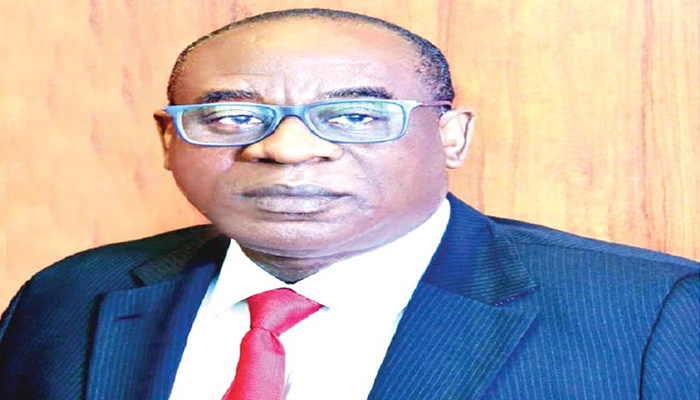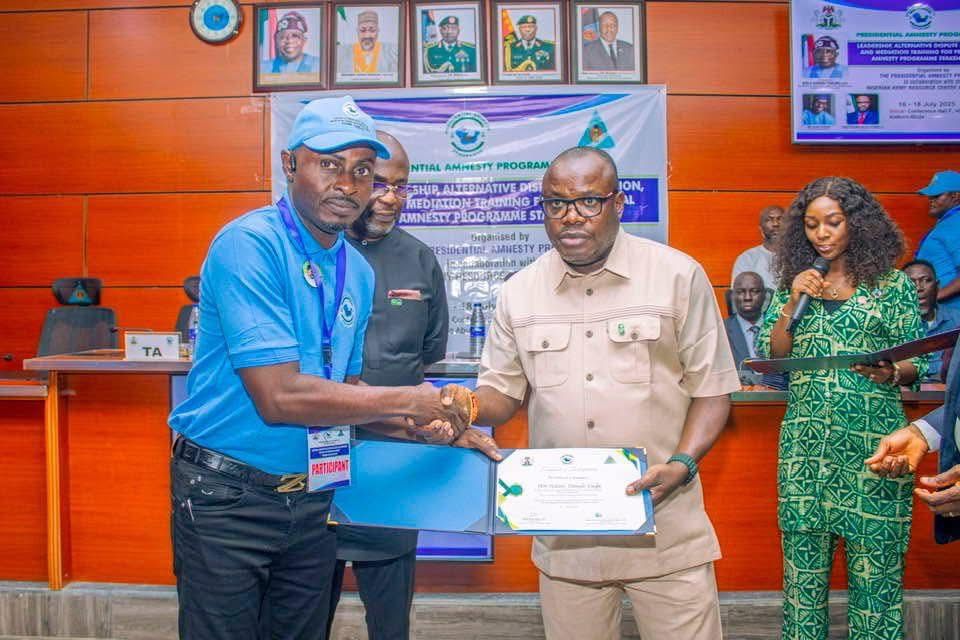Business
CBN Commits to Alleviate Forex Pressure, Announces Increase in Lending Rate

The Acting Governor of the Central Bank of Nigeria (CBN), Folashodun Shonubi, has pledged to address the increasing demand pressure on the country’s exchange rate as the naira continues to depreciate against the dollar.
Shonubi made this commitment while responding to queries from reporters following the conclusion of the two-day Monetary Policy Committee meeting in Abuja on Tuesday.
Over the course of one week, the naira’s value plummeted from 820/$ to 870/$ in the parallel market. The naira has been on a downward trend since the country unified its exchange rates, exacerbated by increasing inflation, rising fuel prices, and other economic challenges.
Shonubi remarked, “The market needs to find its equilibrium. There is a backlog of demand that the market cannot currently meet. Once this demand is addressed, the volatility should stabilize. We have begun taking steps to intervene and will continue to do so until the market aligns with our objectives.”
Regarding the outcome of the Monetary Policy Committee meeting, Shonubi revealed that the majority of members voted in favor of increasing the Monetary Policy Rate (MPR). “Six members voted to raise the MPR: Four by 25 basis points and two by 50 basis points. Five members voted to maintain the MPR. All members agreed to narrow the asymmetric corridor from +100/-700 to +100/-300 basis points around the MPR,” he said.
In conclusion, the MPC voted to increase the MPR by 25 basis points, from 18.50 to 18.75 percent, adjust the asymmetric corridor to +100/-300 basis points around the MPR, keep the Cash Reserve Ratio (CRR) at 32.5 percent, and maintain the Liquidity Ratio at 30 percent.
Based on the projections for the domestic economy, Shonubi explained that the committee members believed they were faced with two policy options: to either hold or raise the policy rate to counterbalance the moderate increase in headline inflation.
While considering the option to maintain the current rate, Shonubi explained that the Committee assessed the implications of persistent inflation on multiple macroeconomic variables, acknowledging the potential negative impact on output growth. He mentioned that all members agreed that the previous sequence of rate increases had significantly slowed down the rate of price rises.
Shonubi further detailed that moderately increasing the policy rate presented a strong alternative, based on anticipated liquidity injections into the economy from recent policy changes and their likely effect on inflation.
The acting CBN governor highlighted that the Committee was cautious in reaching a policy decision, as they noted the necessity to continue backing investments which would eventually lead to the revival of output growth.
Earlier, the Director General of the Nigeria Employers’ Consultative Association, Mr. Wale Oyerinde, expressed concern that the increased Monetary Policy Rate suggests higher borrowing costs, which could adversely impact businesses and manufacturers reliant on borrowed capital. He warned that without appropriate checks, this could lead to an economic impasse as higher rates impede productive activities.
Also commenting on the decision, Muda Yusuf, the Chief Executive Officer of the Centre for the Promotion of Private Enterprise, stated that the hike was anticipated. He explained, “The increase in the Monetary Policy Rate is not surprising given the surging inflation and current pressure on the exchange rate. These are macroeconomic conditions the CBN could not overlook. Concerns arise about the real interest rate, which is currently in negative territory, and worries about the signaling effect of the MPC’s decision.”
However, he observed that the move would likely hurt investors and noted that raising the MPR might not have a significant impact on inflation.
Business
Dangote Refinery Boosts Fuel Exports as Gulf Refineries Shut Down

By: Fabian Apechihin
The Dangote Petroleum Refinery has ramped up fuel exports to international markets amid widespread refinery shutdowns in the Middle East, industry sources confirmed.
A senior official at the $20bn Lagos-based plant told The PUNCH that the facility exported significant volumes of petrol (PMS), diesel (AGO), and aviation fuel (Jet A1) to foreign buyers in August, following earlier shipments in June and July.
The surge comes as Saudi Aramco and other regional producers face heavy maintenance schedules, tightening fuel supply. Aramco has already shut down two plants and plans further closures, including its 460,000 b/d Satorp refinery in Jubail for a 60-day turnaround in November–December. Kuwait and India are also scaling back capacity for maintenance and seasonal demand.
According to Argus Media, these shutdowns are pushing Gulf nations to import record volumes of gasoline, with Saudi Arabia and the UAE sharply increasing purchases from Europe and other markets in recent months.
While some reports pointed to operational constraints at Dangote’s 650,000 b/d facility, the company dismissed such claims, insisting production is on track to reach 700,000 b/d by December. Earlier this year, Aliko Dangote announced the refinery had sold two cargoes of jet fuel to Saudi Aramco and recently achieved exports of about 1 million tonnes of petrol between June and July.
“With Gulf refiners offline, Nigeria has now emerged as a net exporter of refined products,” Dangote said.
Analysts suggest the extended refinery outages in the Middle East will further strengthen demand for Dangote’s output, positioning the Nigerian plant as a key supplier in regional fuel markets.
Would you like me to tighten this further into a 5–6 paragraph wire-style news brief, or keep it as a detailed feature-style report with more context on Gulf refinery shutdowns?
Business
US Oil Exports to Nigeria, Others Fall to 3.3m bpd as Local Output Rises

By: Fabian Apechihin
The United States’ crude oil exports to Nigeria and other African countries fell for the fifth consecutive month in July 2025, averaging 3.3 million barrels per day (bpd), the lowest level since March 2022.
The Organisation of Petroleum Exporting Countries (OPEC) disclosed this in its August 2025 Monthly Oil Market Report (MOMR), attributing the decline to weaker flows to Europe and Africa, particularly Nigeria, but without giving further details.
Industry analysts link the slowdown to the ramp-up of local refining capacity, especially the 650,000 bpd Dangote Refinery, which has reduced Nigeria’s reliance on imported crude, including from the US. Vanguard checks also show that crude importation has slowed further in recent months due to improved domestic production.
According to OPEC data, Nigeria’s crude oil output—excluding condensates—rose by 11 per cent year-on-year to 1.559 million bpd in July 2025, up from 1.386 million bpd in the same period of 2024. This marks the country’s highest monthly production level so far this year.
The Nigerian Upstream Petroleum Regulatory Commission (NUPRC) corroborated the figures, stating that overall output, including condensates, exceeded 1.8 million bpd in July.
Gbenga Komolafe, Chief Executive of the NUPRC, said the milestone was achieved through the agency’s “Project 1 MMBOPD Incremental” initiative, supported by a multi-stakeholder collaborative framework.
“We are glad to report that we crossed the 1.8 million bpd mark on peak production last month, with average production hovering at 1.78 million bpd,” Komolafe stated.
He added that the Commission is working to sustain production growth by optimising the Maximum Efficient Rate (MER) framework, improving produced water management, and aligning operational shutdowns and maintenance schedules to minimise disruptions.
“With these measures and continued collaboration, the presidential mandate on production increase is well within reach,” he said.
Do you want me to make this rewrite more concise for a newspaper front-page brief or keep it detailed like a full energy market report?
Business
NDYPC Hails Otuaro’s Reforms in Presidential Amnesty Programme

• Lauds transparency, fairness in beneficiary selection and grassroots empowerment
• Says reforms align with Tinubu’s Renewed Hope Agenda, restore trust in Niger Delta
The Niger Delta Youths for Positive Change (NDYPC) has commended the Administrator of the Presidential Amnesty Programme (PAP), Dr. Dennis Otuaro, for what it described as bold, people-focused reforms that are restoring trust and delivering tangible benefits to the Niger Delta.
In a statement signed and issued by Comrade Elliott Yibakeni, after the conclusion of leadership training sessions with ex-agitator leaders in Abuja, the group said the PAP, once in urgent need of renewal, is now undergoing a transformation that reflects transparency, fairness, and accountability.
“At a time when public trust in institutions was waning, Dr. Otuaro has emerged as a symbol of credibility and transformation,” the statement read. “His visionary leadership is restoring integrity, empowering communities, and driving a sustainable development agenda that resonates with the aspirations of the Niger Delta.”
According to NDYPC, under Otuaro’s leadership, beneficiary selection has become fair and merit-based, ending years of favoritism and political interference. The group added that access to education, skills training, and empowerment opportunities, both locally and abroad, is now guided by equity and open competition.
The group highlighted several internal reforms, including improved staff welfare, strengthened professional capacity, and strict adherence to best practices in public procurement. These, it said, have made the PAP more efficient, responsive, and transparent.
NDYPC also praised Otuaro’s inclusive governance style, noting his sustained engagement with traditional rulers, women leaders, civil society organizations, and local communities. This approach, the group said, has strengthened peace-building efforts and deepened trust between the PAP and the people it serves.
In line with President Bola Ahmed Tinubu’s Renewed Hope Agenda, the PAP has maintained consistent payment of stipends to ex-agitators and extended direct support to vulnerable populations. NDYPC also applauded new healthcare interventions for ex-agitators facing health challenges.
The statement further commended the programme’s investments in scholarships, vocational training, and economic empowerment initiatives aimed at preparing Niger Delta youths for leadership, innovation, and sustainable livelihoods.
“Every decision reflects a deep commitment to public trust, responsible stewardship, and long-term development,” NDYPC stated. “Under Dr. Otuaro’s watch, the Niger Delta is rising stronger, united, and filled with renewed hope.”
-

 Uncategorized5 years ago
Uncategorized5 years agoFG, states urged to harness flooding for ranching, others with technology – Agbaje
-

 Headlines10 years ago
Headlines10 years agoBreaking: EFCC seals Borno House of Assembly, as Hon members take to their heels
-

 News11 years ago
News11 years agoNigeria Security Operatives Stage Manhunt For Homosexual Perpetrator
-

 News9 years ago
News9 years agoHow 21-year-old Girl fled community over accusation of lesbianism
-

 News10 years ago
News10 years agoYobe Gov Moves Against Deputy
-

 Opinion7 years ago
Opinion7 years ago7 signs she has friend zoned you
-
Technology4 years ago
Online job placement company headhunts women
-

 Headlines10 years ago
Headlines10 years agoBorno Dep Gov Abducts Another Church Leader





